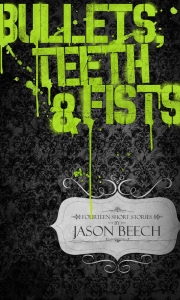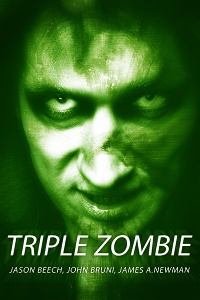Welcome to a new section I hope to expand in the future, asking authors whose work I’ve liked about ‘stuff’.
Kicking it all off is prolific Scottish crime novelist Ed James, author of the Scott Cullen series: GHOST IN THE MACHINE (read my review here), DEVIL IN THE DETAIL, and FIRE IN THE BLOOD. He released his new book DYED IN THE WOOL yesterday, Monday 8 July 2013.

Can you give some background about yourself?
Certainly. I’m a Scottish writer in my mid-30s. I don’t do this gig full-time (boy would I love to) and instead work in the financial services sector in IT. I’ve been writing for eight years now, and GHOST IN THE MACHINE is the first thing that I was comfortable enough with that I put out there – that took three years to nail, but most of that was me learning.
You’ve written four books. Which one are you most satisfied with?
I’ll say it’s the fourth that I’m most pleased with – DYED IN THE WOOL – which I’m just in the middle of submitting to Amazon for sale on Monday [8 July 2013]. It’s taken longer than the second and third but it’s richer and stronger. I also used a professional editor for the first time – previously it had been friends and family, and I felt guilty about chasing them and so on – and that really helped at both a structural and line level. Of the first three, I think DEVIL IN THE DETAIL is the best.
Which was the easiest to write, which the hardest?
The easiest was DYED IN THE WOOL, though big changes in my personal life made it difficult. The reason it was easy is that I understand my craft that much better, and I’ve got my process/method up and running which certainly works for me.
GHOST was certainly the hardest – it went through about ten major drafts before I’d even got the story sorted.

What made it hard? The plot? The language? Something else?
Plot, definitely. Looking back at the very first draft – which I did for a recent redraft – the thing I noticed that was good was the dialogue (and most of my books tend to be dialogue). What was weak in terms of writing was description, which later drafts really focused on improving, but mainly the plot was the hard bit. The thing I learnt from that was to get the story nailed at synopsis/outline level – it’s much easier throwing 10,000 words of outline around than 100,000 words of novel. That’s not to say the “architect” approach (as opposed to “gardener”) will give a perfect novel first time – it won’t – but it does get the big things sorted and allow you to really focus on the detail level. I improvise a lot at the detail level in terms of characterisation and language but I can’t do it for plot – it’s just too much to focus on writing and plotting at the same time.
Where’d you get Bain from? Is he somebody you read about, or someone you know and then gave a badge to?
There are a few people in there. He’s an arrogant bastard and that comes from a manager I had at work who had no concept of self-analysis or introspection. He’s an angry bastard and that comes from a mate, though that’s more extreme. He’s a sweary bastard and that’s influenced by a couple of test managers I’ve worked with, any Scottish football fan but also Malcolm Tucker from THE THICK OF IT, which is a UK TV series with some world-class swearing.
In terms of name, Bain comes from a neighbour of my girlfriend from years ago who used to play really loud music at all hours and we got into big arguments with him.
Did you deal with the arrogant manager the way Cullen does? As in seethe, cool down, analyse the situation, then make him look like a silly bugger with a cool solution?
Yes and no. A lot of the time, I seethed and let it eat away at me. Over the last few years I’ve learnt to cope in those situations, and I’ve also become adept at managing managers, if that makes sense. Turning a sympathetic eye to guys like Bain, they just want to do the right thing (though the definition of right thing in Bain’s head is perhaps skewed) and you can use them as weapons.
A lot of the prep for writing is in the “I wish I’d said that” after the event analysis, where you run through the scenario in your head again until you win…

How scary is it to think that there are Bains out there trying to solve cases?
I like to think it’s fiction, but sadly it’s not that far off. In reality, I think British policing has sorted itself out to a large extent, away from the 70s excesses you’d read in a David Peace novel, but not too far with the Stephen Lawrence stuff going on just now. Maybe there are Bains, but they’re hiding in Cullen’s clothing…
Could you conceive of a Bain spin-off, like Gene Hunt going solo after Life on Mars?
Another thing about Bain is that he’s meant to be the typical Scottish DI. In another world, he’d be the protagonist, rather than antagonist. There are a lot of books about that sort of copper… I did consider writing a short story from his perspective – called BANE – but I never got round to it. And he features quite heavily in book four, shall we say.
The closest to a Bain solo book would be FILTH by Irvine Welsh…
Why crime? Have you ever thrilled to breaking the law?
No comment!
Seriously, I find the books to be seriously engrossing, both from the police process side to the “inside the head of a killer” side. Ian Rankin said that crime novels are novels that reflect society and I fully agree. I’ve reflected many facets of society in my first three – social media, big banks, paedophilia, drug use, religion, alcoholism, family feuds – and it’s something I love doing and have continued in book four.

What’s your favourite crime novel?
BLACK AND BLUE by Ian Rankin. That’s the peak of Rebus. The story is incredible and the way it links to a real life crime is genius.
Other notable books are anything from James Ellroy’s LA QUARTET (in fact, anything by him with the exception of the Lloyd Hopkins stuff), plus any David Peace. Worthy entries include FILTH and CRIME by Irvine Welsh.
Does excitement or fear grip you at the prospect of James Franco adapting Ellroy’s American Tabloid?
I’ve got a lot of time for him. When I saw him in the first Spider-Man film I thought he was a generic Hollywood actor, but he’s done some very good stuff since as an actor, things like Pineapple Express which is a film I totally love. Whether he’s right for adapting Ellroy, who knows – I try to keep the books and films separate anyway…
What’s your favourite overall novel?
THE CROW ROAD by the late Iain Banks. As a Scotsman (not a particularly proud one, mind) it really speaks to me. So much of it is just perfect. Strangely enough, you just reviewed that on your blog… I was seriously affected both when he announced his cancer and when he eventually died.
What do crime novels have to tell us as a species/society, if anything?
That we’re fucked. Seriously fucked. There are too many people on the planet and we don’t manage or organise ourselves very well – and we spend too much money on the wrong things. Individually, people focus on the wrong things through choice or peer pressure. Corporations hold too much power.
But I’d also say that it’s not like we’ve come from some amazing period of enlightenment to where we are now. In a lot of ways, we’re in the best times ever – crime rates are high, but I’d suggest that more people are reporting them and more people are coming to justice (the super-prison arguments aside, obviously). I could see our society going two ways: downwards into a climate change-fuelled nightmare; or upwards where we sort our planet and our society out, and we do the right things – like get so many people off the planet into space and so on. Yeah, I do like sci-fi.
Do you see differences between Scottish and English crime writing?
Yes. One of the things I’m proud of Scotland for is its sarcastic, untrusting attitude. Everything is questioned, nothing taken seriously. England tends to have a more rosy spin on things and misses that bite. That said, I have read a lot of incredible English crime novels, mainly MARK BILLINGHAM and DAVID PEACE. I have read a number of celebrated crime authors from south of the border where I just can’t get past the first few chapters. A lot of them tend to read more like screenplays or teleplays than novels – Scottish crime writers tend to celebrate the novel as an artform in itself. Also, I think Scottish crime tends to have a lot of humour – and not forced, jolly narration humour, but real comedy. CHRIS BROOKMYRE and STUART MACBRIDE are classic examples of the wide spectrum of Scottish humour.
What differences do you see between British/Scottish crime novels and the American variety?
Guns. American crime has a lot of guns. When you have a gun in a British novel, it’s an extreme event, but guns are so commonplace in America. It’s much easier to kill someone in America by virtue of that. That’s not to say we’re any better as people or whatever, we’ve just got far fewer guns.
What’s the best crime film ever made? Why?
It’s got to be either PULP FICTION or HEAT. Why?
PULP FICTION is an absolute masterpiece – the dialogue, the action, the humour, the characters, the off-piste structure. Tarantino hasn’t made a film as good since, but then I don’t think anyone has.
HEAT is just on that fine line between the excitement of a film and the depth and intensity of a TV series. It’s not very long, but it feels like so much happens and you get inside the heads of both PACINO and DE NIRO’s characters. A lot of hype centred around the scene where they’re onscreen for the first time together, but the whole film has that electricity.
What’s your favourite Pulp Fiction moment? “That’s a pretty fuckin’ good milkshake” perhaps?
Where do you see yourself in 10 years?
I’d love to be writing full-time, I really would. Nothing excites me more than writing.

Thanks to Ed for taking time out to get involved, though his dodging of the question about breaking the law means he should get a knock on the door from a Bain-style inspector any day soon. Watch out sunshine…
You can buy Ed James’ books from the following links:
http://ow.ly/mL4zF (USA)
http://tinyurl.com/kv4lvmf (Dyed in the Wool – USA)
http://tinyurl.com/ly9b3ap (UK)
http://tinyurl.com/lm87xmw (Dyed in the Wool – UK)


1 Pingback